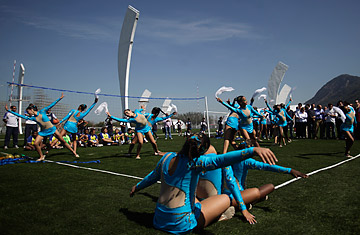
Rhythmic gymnasts perform during the inauguration ceremony of the Athletes' Park in Rio de Janeiro on Aug. 6, 2011. The park will serve as recreation space for Olympic athletes
Out on the far west side of Rio de Janeiro, in a zone where a host of Summer Olympics events will take place five years from now, stands a great example of how to plan for a major sporting event. And how not to.
On one hand, there is the Athletes' Park, an $18 million 1.3 million-sq.-ft. (123,000 sq m) space for competitors' relaxation between events. Formally opened in July, the park was delivered early, on budget and will be a "legacy venue" that the general public can use before and after the 2016 Olympics. But just a few miles away is the 970,000-sq.-ft. (90,000 sq m) Pan village, built to house athletes during the 2007 Pan American Games. Today, almost four years after the athletes moved out and Brazilian residents moved in, part of the village and the roads around it have caved in, sunk by the effects of haphazard, last-minute construction.
The question is, Which example will Brazil be known for after it hosts both the soccer World Cup in 2014 and the Summer Olympics two years later? Aside from racing to build venues for those events, the country is adding the infrastructure necessary to meet the demands of its booming economy — and on both counts, Brazilians seem as anxious as they are energized. As encouraging as the Athletes' Park may be, Brazil's World Cup preparations are late and over budget, and officials now acknowledge they took so long to start work at some sites that temporary structures may have to be used. The proposed bullet train between Rio and São Paulo, Brazil's largest city, stalled in the planning stages. More generally, public-works programs across the country are routinely late, over budget and subpar: new metro lines often shut down during rush hours, cracks have appeared in recently built government buildings and highways have developed craters just months after being inaugurated.
A big part of the problem, say watchdogs, are the kickbacks and cronyism that are still too common in Brazilian officialdom. "Everything is a pretext for corruption," says Gil Castello Branco, secretary-general of Contas Abertas, an NGO that monitors public spending. But at least in Rio, the confident young mayor, Eduardo Paes, is determined to change that — and to make sure that his city's Olympics chiefs avoid the mistakes made so far by Brazil's World Cup organizers. "We are using London," host of the 2012 Summer Olympics, "as our model in terms of timing and planning," says Paes. "By the end of this year, all the major infrastructure projects will have started. Everything is ahead of schedule" for 2016.
To its credit, Rio has already begun work on roads, metro lines and venues, and it plans to revitalize its run-down port area, as well as integrate hundreds of hillside favelas, or slums, with the rest of the beach-beautiful metropolis they overlook. But while Paes has turned the city around since taking office almost three years ago, he still has to prove that he can reverse Rio's reputation for not following through. It secured the Pan Am Games, for example, with pledges to build a ring-road system, a new state highway and 34 miles (55 km) of new metro line — none of which ever materialized.
Equally big worries are cost and quality. The Pan Am Games are believed to have cost at least six times the original $177 million budget, and the bills for stadiums being built or renovated for the World Cup are swelling as well. Revamping Rio's iconic Maracanã stadium — its third facelift in 11 years — will exceed $600 million, and the cost of the new São Paulo site slated to hold the World Cup's opening match has jumped from an original estimate of $205 million to $480 million.
Then there's the shadow of construction standards cast by the Pan village, a bucolic assortment of colorful apartment blocks interspersed with pools and gardens alongside picturesque lagoons. When the apartments were sold off after the 2007 Games, residents' complaints were almost immediate. Within less than a year, parts of the grounds and access roads collapsed because the city had done the work in a hurry after the builder in charge of the project went bust. "They needed to do it quick because if they didn't, there wouldn't be any [Pan Am] Games," says resident Fábio Yaksic. "And this is what happens when you do work [too] quickly."
Studies have since concluded the apartment buildings are safe, and the city has promised to invest $2.5 million to stabilize the affected areas. Officials, however, can't guarantee other roads and gardens won't give way, infuriating residents. But Paes points out the debacle was a previous administration's, and few would dispute that he's done an admirable job restoring a degree of respect and optimism for a city that is now seeing less crime and more investment than at any time in decades.
Still, given Rio's history — and the lack of any positive legacy from the Pan Am Games — skepticism abounds. More examples like the Athletes' Park, and fewer like the Pan village, would help alleviate it.
